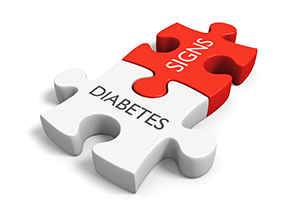
Do you know that about 1 in 4 people suffering from diabetes aren’t even aware they have it? Being a person of weight significantly increases the risk of developing diabetes. If left untreated, the devastating consequences of diabetes include blindness, limb amputations, and kidney failure.
Here are 7 warning signs that should not be ignored:
- Unquenchable thirst and a frequent urge to pass urine: These symptoms are caused by excessive build-up of sugar in the blood. Your kidneys work very hard to filter out the sugar and this causes increased urination, dehydration, and thirst.
- Constant hunger and unplanned weight loss: Diabetes prevents sugar in the blood from reaching the cells and this causes you to constantly feel hungry. For nourishment, your body starts burning fat and this causes you to lose weight.
- Feeling tired all the time: As your body has trouble utilizing sugar, your energy levels start to plummet. This is compounded by the fact that you are dehydrated from excessive urination.
- Blurring of vision: Excessive sugar in your blood can cause it to become thick. This causes fluid from other parts of your body including your eye lens to be pulled into your blood vessels. Without enough fluid in your eye lenses, you have difficulty focusing resulting in blurring of vision.
- Slow-healing wounds: It is possible that the high sugar level in the blood interferes with your body’s natural healing mechanism slowing down the healing of wounds and ulcers.
- Frequent infections and skin problems: A common symptom of diabetes is increased susceptibility to different kinds of infections. Female diabetics may be prone to bladder and vaginal infections. Skin conditions such as boils, carbuncles, and large blisters may also be seen.
- Numbness and tingling in the hands and feet: Nerve damage (diabetic neuropathy) which is one of the complications of diabetes causes altered sensations in the hands and feet.
If you are experiencing any of these symptoms and they do not seem to be getting better, please contact your doctor as soon as possible.

